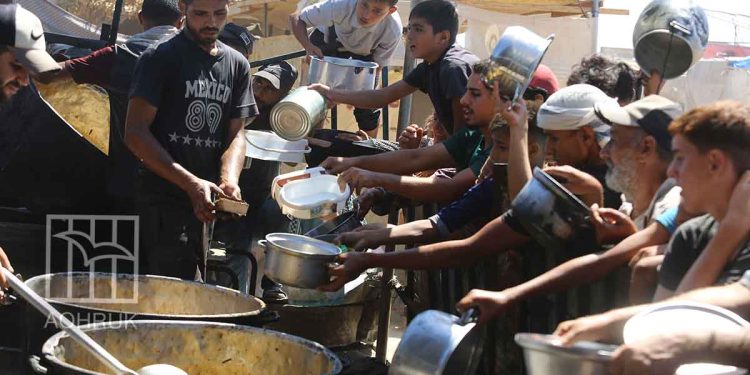Three leading UN agencies including the Food and Agriculture Organization (FAO), the World Food Programme (WFP) and the United Nations Children’s Fund (UNICEF), have warned that the Gaza Strip is facing imminent famine as a result of the ongoing, comprehensive siege imposed by the Israeli occupation, which is depriving the population of food, water, and healthcare.
The warning came in a new report titled Integrated Food Security Phase Classification (IPC), which revealed that all of Gaza’s approximately 2.1 million residents are experiencing severe food insecurity, which is a situation unparalleled in any other humanitarian context in the world today.
According to the report, 93% of the population falls within Phase 3 to Phase 5 of the IPC scale, which measures levels of food insecurity. An estimated 244,000 people (12%) are currently in Phase 5 classified as catastrophic famine. A further 925,000 people (44%) are in emergency conditions, while the remainder face acute food crises.
UN data shows that around 470,000 people are currently experiencing actual famine, while 71,000 children and 17,000 mothers require immediate treatment for severe acute malnutrition. An additional 60,000 children are expected to require urgent treatment by the start of 2025.
The agencies predict the food security situation will continue to deteriorate between May and September 2025, with no improvement in sight, leaving the entire population in crisis or worse.
FAO reported that approximately 75% of Gaza’s agricultural land has been destroyed by military operations since October 2023, and two-thirds of the agricultural water wells have been damaged, leading to the near-total collapse of local food production.
Despite the distribution of more than 2,100 tonnes of animal feed and veterinary supplies, the agencies stressed that supplies remain insufficient. They estimate that 20–30% of Gaza’s livestock is at risk of death if the blockade on veterinary aid continues.
The report also notes that over 116,000 tonnes of food aid are currently stuck at border crossings, with no permission to enter, despite the fact that this aid could feed nearly one million people for four months. Meanwhile, all food stocks in Gaza have been depleted, and all subsidised bakeries have shut down due to the lack of wheat flour and cooking fuel since late April.
WFP Executive Director Cindy McCain stated: “Entire families are starving while aid sits at the gates,” adding, “Famine doesn’t arrive suddenly… it is created when people are deliberately denied access to food and care.”
UNICEF Executive Director Catherine Russell stressed that hunger and malnutrition “have become a daily reality for Gaza’s children,” urging immediate international action to prevent a deeper catastrophe.
The UN agencies affirmed that the continued denial of humanitarian aid constitutes a direct violation of international humanitarian law, particularly the Geneva Conventions, which obligate warring parties to ensure humanitarian access to civilians and prohibit starvation as a method of warfare.
Under international law, famine is defined as a war crime when civilians are deliberately starved. It may also constitute an act of genocide if accompanied by the systematic denial of essential means of survival – a classification supported by the indicators highlighted in the UN report.




























